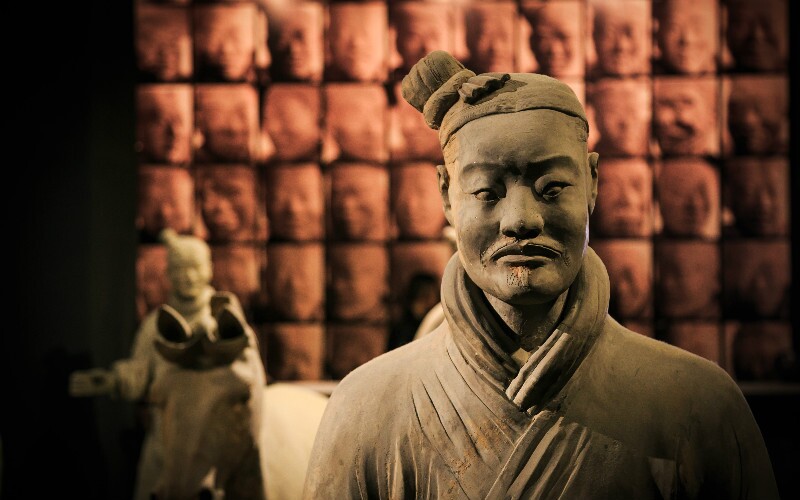Did the Devil God Tan Tai Jin Really Exist in Ancient China? Till The End Of The Moon (长月烬明)
If you have been following recent Chinese Xianxia dramas, you might be familiar with the character of Tan Tai Jin, known as the Devil God. Tan Tai Jin was originally a prince from the neighboring Kingdom of Jing. He grew up unloved and served as a diplomatic hostage in the Kingdom of Sheng. Despite his difficult upbringing, he eventually ascended the throne of Jing and brought prosperity and stability to his people. Tan Tai Jin implemented policies to unify the kingdom and showed kindness and equality to the refugees from Sheng.

In ancient China, a similar young man existed in a faraway time. In the year 259 BCE, Ying Zheng was born as the son of a hostage in the state of Zhao. Since his birth, he lived as a hostage. During his childhood, Zhao suffered a devastating defeat in the Battle of Changping against the Qin army. The Zhao soldiers were mercilessly slaughtered, resulting in a loss of 450,000 lives. To make matters worse, the victorious Qin army pursued Zhao and pushed deep into its territory. The people of Zhao, already depleted of resources and unable to fight back, held deep hatred towards the people of Qin and wished for the extermination of the Qin king's descendants. These fearful days lasted for two years.
In 257 BCE, King Zhaoxiang of Qin sent Wang Jian to besiege Handan, the capital of Zhao. The situation became extremely critical, and as the situation worsened and the Zhao king faced repeated defeats, he became furious and decided to order the execution of the Qin hostages and their entire families. Ying Zheng's father, Ying Ren, upon hearing this news, escaped from Handan overnight, abandoning mother and son in Zhao without any consideration for their lives or their bond as a family.
In response, Zhao planned to kill Ying Zheng and his mother to vent their anger. However, due to the support of powerful relatives from Ying Zheng's maternal side, the mother and son managed to hide and survive. Nevertheless, Ying Zheng remained trapped in the role of a hostage and was kept under strict surveillance in Zhao.
Until the age of nine, Ying Zheng, who would later become Qin Shi Huang, lived a life of imprisonment. He was unable to set foot on his homeland, confined to a foreign land. His freedom of movement was restricted, and he had to be cautious at all times. Any lapse in attention could cost him his life. For the young Ying Zheng, this was undoubtedly a painful experience, causing immense physical and psychological trauma.

After the year 251 BCE, Ying Zheng's great-grandfather, King Zhaoxiang of Qin, passed away, and his grandfather, King Xiaowen of Qin, ascended the throne. Ying Zheng's father, Ying Ren, was named the Crown Prince in an effort to improve relations between Qin and Zhao. As a result, Zhao sent Ying Zheng and his mother back to Qin.
At the age of nine, Ying Zheng set foot on his homeland for the first time. Unfortunately, his fortunes took a turn for the worse as King Xiaowen of Qin passed away just three days after his coronation. Ying Ren, Ying Zheng's father, assumed the throne. However, three years later, King Zhuangxiang of Qin also passed away, and at the age of thirteen, Ying Zheng inherited the throne, becoming the King of Qin. Despite being a mere child at thirteen, the sudden turn of events left him bereft of both his grandfather and father within three years. The pain and grief had not yet subsided when he was burdened with the responsibility of governing the realm. In that moment, he felt lost and helpless.
Having endured a lonely and difficult childhood, Ying Zheng's resilience was forged through adversity. These tragic experiences shaped his unyielding character and, upon assuming the throne, he displayed tenacity and diligence, going on to accomplish great feats that would earn him the title of an eternal emperor praised by future generations. With the unification of the lands and the implementation of reforms, Ying Zheng's governance as the King of Qin was truly remarkable.
After successfully unifying the six states, a series of reforms were enacted to govern the country. These reforms encompassed various aspects. Politically, a feudal system was established, consolidating political power under the central government. Economically, a unified currency and measurement system were implemented, and the control over currency production was centralized to prevent market chaos. Culturally, a unified script was adopted, promoting cultural integration and facilitating communication between people of different states.
These comprehensive reforms contributed to the increasing strength of the Qin state, bringing prosperity and contentment to its people, who enjoyed a comfortable and prosperous life.

